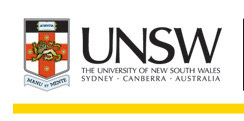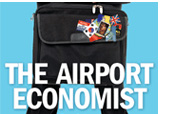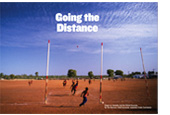The Department of Youth: Can Colombia rebuild its social capital?
By Tim Harcourt*
Reporting from Bogota, Colombia
The Australian state of South Australia recently went through a brand exercise to help sell the state and its capital city Adelaide to the world in terms of trade, investment, education and tourism. There’s no doubt the Adelaide (disclosure – the airport economist grew up there and advises the Premier) is a civilized pleasant city (in a progressive state that is relatively small in population) as it was recently voted Australia’s most liveable city.
Many states, cities and nations now invest a lot in place ‘brands’ to attract business, students and tourists – even immigrants. As far as liveability goes, Adelaide has plenty going for it, with a pleasant climate, affordable housing, world class education and a lively cultural scene.
But imagine if you were given the same task for the South American country of Colombia instead of South Australia? It would be a tough gig. After all, Colombia is the place where just a decade ago it had the highest homicide rate in the world, where a third of legislators had links to paramilitary groups, where the political system was dysfunctional. Despite the amazing efforts of the past decade, thanks in part to the policy of ‘democratic security’ initiated by then President Alvaro Uribe, many parts of the country outside the main cities do still suffer from guerilla violence in particular given the pressure of the peace talks. Colombian trade unionists have also been particularly targeted according to the International Confederations of Free Trade Unions (ICFTU) as documented by Harvard political scientist James A. Robinson, the co-author of the celebrated book Why Nations Fail, though the government has made serious efforts to reduce these attacks.
Whilst visiting Bogota, the capital of Colombia, I actually met with the man in charge of selling the city and the country to the world, David Mello. He explained that despite its history, that Colombia and Bogota in particular, had plenty of going for it. “We are 5 hours from New York, Mexico City and Sao Paulo, we attract 78 per cent of all foreign direct investment that comes to Colombia in growing new parts of the economy like professional services, engineering, light manufacturing, life sciences, biotechnology and information and capital services.” Mello is also proud of Bogota’s social agenda: “Our program Bogota Humana, celebrates diversity in the city in terms of tolerance of Colombia’s different races, religions and gender preferences. We want to promote human development and reduce anti- discrimination so the city can be regarded as a cultural, tolerant hub of creativity and culture. We are very proud of the fact that Bogota was selected as one of UNESCO’s World Cities of Music.”
Mello is an example of the new generation of young Colombians wanting to project a different image to the world than its troubled past. Every major business leader I met in government and chambers of commerce in Bogota (and in Medellin on a previous visit to Colombia) was under 40, highly educated with international experience. For example, Ana Milena Cortazar Mejia, the International head of ANDI, Colombia’s main chamber of commerce group, was young an accomplished with multiple degrees, had lived in China and Japan and speaks Mandarin. She explains: “Young Colombians have a world view, we look to Asia now as much as we look to Europe or the rest of the Americas and we see Australia as a great reference point to Asia, an important bridge. And importantly, we see Australia as a symbol of good practice in business and economic management.”
Australia as a ‘Symbol of good practice’ is a view shared by many Colombian business leaders and government officials according to Crispin Conroy, Australia’s Consul General in Bogota and leading Australian expert in Latin America. “The emerging Colombian resources sector is facing key challenges in dealing with the environment, community issues, indigenous rights and tensions with agricultural land owners. Australia is a leading proponent of Corporate Social Responsibility, and Colombian companies are looking to the Australian example.”
A visit to the Terranova project a coal mine owned by New Age Exploration, showed what is needed in Colombia. The mine has good quality coal but its antiquated mining practices will soon get an injection of capital to lift its occupational health and safety standards. Austrade-UNSW research shows that on average, Australian businesses that venture abroad in export and outward investment help raise health and safety standards (and average wages, conditions and employment security) in emerging markets in Latin America, Asia and Africa. Colombia and Terranova is no exception. In fact many Colombian mine managers are Australian educated including New Age Exploration’s Carlos Felipe Barrera, who studied at graduate level at the University of New South Wales (UNSW). Barrera believes his education in Australia was “pivotal” to his career in the resources sector. “Australians are highly professional, practical and easy to work with. Studying there made a big difference as I was amongst cultures from all over the world – particularly Asia – and it advanced my professional development when I returned to Colombia. Australia was an excellent bridge to Asia for me personally.”
Barrera is not alone. According to Conroy, “At last count there were 10,000 Colombians students in Australia, second only to Brazil on 16,000 and ahead of Chile, Peru, Argentina, Uruguay and Mexico. They are a vibrant, dynamic, lively group on Australian campuses and having an Australian education is now becoming well regarded in business circles here. They also have a great work ethic and strong service culture. I am regularly contacted by enthusiastic young Colombians looking for internships with Australian companies.”
Colombian students are very active in promoting their country and make good ambassadors abroad particularly given Colombia’s image issues from the past due to drug wars, high crime rates and political unrest. According to Ana Milena Cortazar Mejia, ANDI runs a strong alumni program to promote messages about the country for Colombians abroad to spread throughout their business and education networks. Recently young Colombians ran a social network campaign to ensure that foreigners spelt their country’s name right (that is, Colombia not Columbia as in Columbia University or British Columbia in Canada). That may be a sign that the Colombian brand is turning around through the strength of its young educated, internationally focused population.
So whether you are in Adelaide, South Australia or Bogota, Colombia, your brand matters. It shapes how the world sees you and determines how you will attract investment, trade and people. As a young Colombian business professional Monica Ramirez put it: “Our generation in Colombia is part of a ‘small and silent revolution to turn around our international image and economic fortunes. Colombians used to believe in education so they could get out of the country now we invest in education so we can stay and make a contribution to the country’s future.”
*Tim Harcourt is the J.W.Nevile Fellow in Economics at the University of New South Wales, Sydney, Australia and author of The Airport Economist www.theairporteconomist.com
He travelled to Colombia courtesy of the Australian Department of Foreign Affairs and Trade (DFAT) and the Council of Australian Latin American Relations (COALAR). Thanks are due to Crispin Conroy and Monica Rameriz for hosting my visit to Colombia.













No Comments so far ↓
Comments are closed.